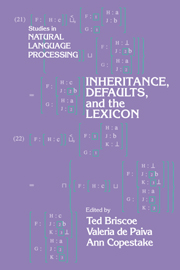Book contents
- Frontmatter
- Contents
- Contributors
- 1 Introduction
- 2 Skeptical and Credulous Default Unification with Applications to Templates and Inheritance
- 3 Prioritised Multiple Inheritance in DATR
- 4 Some Reflections on the Conversion of the TIC Lexicon into DATR
- 5 Norms or Inference Tickets? A Frontal Collision between Intuitions
- 6 Issues in the Design of a Language for Representing Linguistic Information Based on Inheritance and Feature Structures
- 7 Feature-Based Inheritance Networks for Computational Lexicons
- 8 A Practical Approach to Multiple Default Inheritance for Unification-Based Lexicons
- 9 The ACQUILEX LKB: An Introduction
- 10 Types and Constraints in the LKB
- 11 LKB Encoding of Lexical Knowledge
- 12 Defaults in Lexical Representation
- 13 Untangling Definition Structure into Knowledge Representation
- Appendix A A Bibliography of ACQUILEX Papers Connected with the LKB
- Appendix B The LKB Description Language Syntax
- Appendix C Software Availability
- References
- Author index
- Subject Index
5 - Norms or Inference Tickets? A Frontal Collision between Intuitions
Published online by Cambridge University Press: 01 April 2010
- Frontmatter
- Contents
- Contributors
- 1 Introduction
- 2 Skeptical and Credulous Default Unification with Applications to Templates and Inheritance
- 3 Prioritised Multiple Inheritance in DATR
- 4 Some Reflections on the Conversion of the TIC Lexicon into DATR
- 5 Norms or Inference Tickets? A Frontal Collision between Intuitions
- 6 Issues in the Design of a Language for Representing Linguistic Information Based on Inheritance and Feature Structures
- 7 Feature-Based Inheritance Networks for Computational Lexicons
- 8 A Practical Approach to Multiple Default Inheritance for Unification-Based Lexicons
- 9 The ACQUILEX LKB: An Introduction
- 10 Types and Constraints in the LKB
- 11 LKB Encoding of Lexical Knowledge
- 12 Defaults in Lexical Representation
- 13 Untangling Definition Structure into Knowledge Representation
- Appendix A A Bibliography of ACQUILEX Papers Connected with the LKB
- Appendix B The LKB Description Language Syntax
- Appendix C Software Availability
- References
- Author index
- Subject Index
Summary
Abstract
Theories of nonmonotonic reasoning are, on the face of it, of at least two sorts. In Circumscription, generic facts like Birds fly are taken to be essentially normative, and nonmonotonicity arises when individuals are assumed to be as normal as is consistent with available information about them. In theories like Default Logic such facts are taken to be rules of inference, and nonmonotonicity arises when available information is augmented by adding as many as possible of the inferences sanctioned by such rules. Depending on which of the two informal views is taken, different patterns of nonmonotonic reasoning are appropriate. Here it is shown that these different patterns of reasoning cannot be combined in a single theory of nonmonotonic reasoning.
Introduction
Nonmonotonic reasoning is that which lacks a monotonicity property which has been taken to be a characteristic of logical reasoning. In a theory of nonmonotonic reasoning, the consequences of a set of premises do not always accumulate as the set of premises is expanded. Nonmonotonicity has been researched in artificial intelligence because people reason nonmonotonically, and this in ways which seem directly related to intelligence. One important example of this is in commonsense reasoning about kinds, where jumping to conclusions enables intelligent agents to save time spent on gathering information.
In just what way is such jumping to logically invalid conclusions reasonable?
- Type
- Chapter
- Information
- Inheritance, Defaults and the Lexicon , pp. 58 - 73Publisher: Cambridge University PressPrint publication year: 1994
- 1
- Cited by



